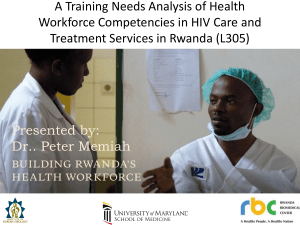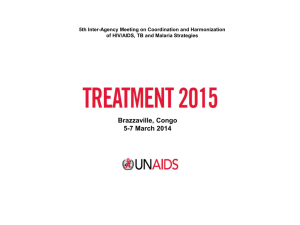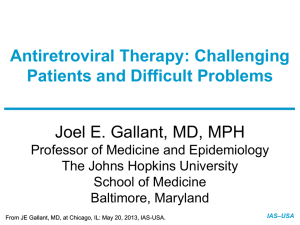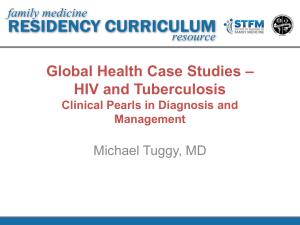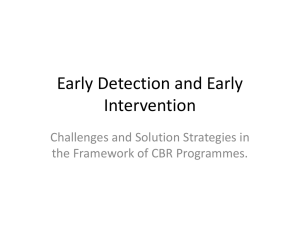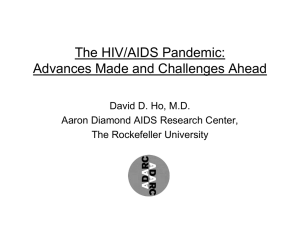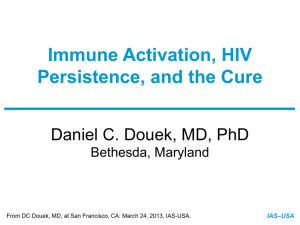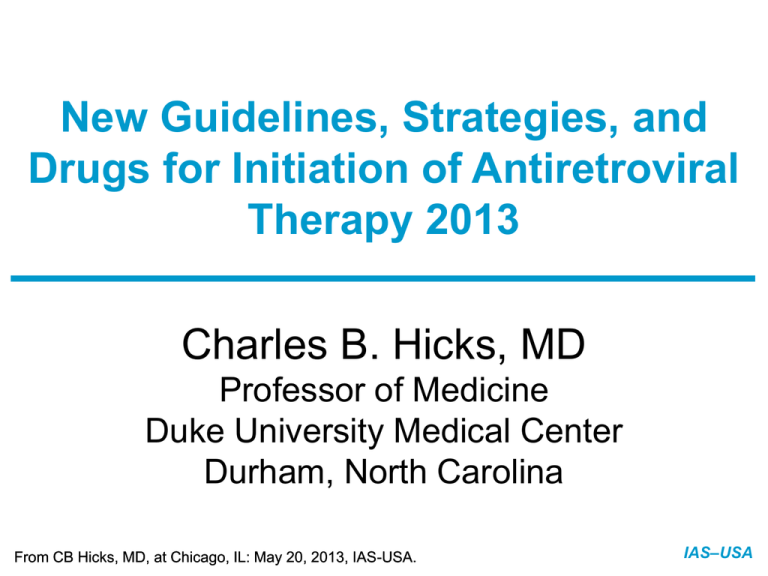
Slide 1 of 11
New Guidelines, Strategies, and
Drugs for Initiation of Antiretroviral
Therapy 2013
Charles B. Hicks, MD
Professor of Medicine
Duke University Medical Center
Durham, North Carolina
From CB Hicks, MD, at Chicago, IL: May 20, 2013, IAS-USA.
IAS–USA
Improving Practical Skills for Primary Care of HIV-Infected Patients
Slide 2 of 11
clinicaloptions.com/hiv
Goals of Antiretroviral Therapy
Reduce HIV-associated morbidity and prolong
duration and quality of survival
Restore and preserve immunologic function
Maximally and durably suppress HIV-1 RNA
– Persistently below level of detection (< 20-75
copies/mL, depending on the assay used)
– Isolated “blips” not uncommon in successfully treated
patients and not thought to predict virologic failure
Prevent HIV transmission
DHHS Guidelines for Antiretroviral Therapy in Adults and Adolescents. March 2012.
From CB Hicks, MD, at Chicago, IL: May 20, 2013, IAS-USA.
Slide 3 of 11
Improving Practical Skills for Primary Care of HIV-Infected Patients
clinicaloptions.com/hiv
Changing Criteria for Antiretroviral
Therapy Initiation in DHHS Guidelines
CD4+
Count,
cells/mm3
1998
2001
2006
2008
2009
2012
> 500
Offer if
VL > 20K
Offer if
VL > 55K
Consider if
VL ≥ 100K
Consider in
certain
groups*
Consider†
Treat
110-500
Offer if
VL > 20K
Consider if
VL > 55K
Consider if
VL ≥ 100K
Consider in
certain
groups*
Treat
Treat
200-110
Offer if
VL > 20K
Offer, but
controversy
exists
Offer after
discussion
with patient
Treat
Treat
Treat
Treat
Treat
Treat
Treat
Treat
Treat
< 200 or
symptomatic
*Pregnant women, patients with HIV-associated nephropathy, and patients with HBV that requires treatment.
†50% of panel members recommended starting antiretroviral therapy; 50% of members viewed treatment as optional.
Wilkin T, et al. Available at: http://inpractice.com.
From CB Hicks, MD, at Chicago, IL: May 20, 2013, IAS-USA.
When to Start:
2013 DHHS Guidelines
Slide 4 of 11
Changes reflect increasing evidence of the
harmful impact of ongoing HIV replication on
AIDS and non-AIDS disease progression and
the benefit of effective ART in preventing
secondary transmission of HIV.
ART is recommended for all
HIV-infected individuals;
strength of recommendation
varies according to CD4 cell
count.
• CD4 cell count <110 cells/mm3 (AI)
• CD4 cell count 110-500 cells/mm3 (AII)
• CD4 cell count >500 cells/mm3 (BIII)
ART is strongly
recommended for
individuals with the following
conditions regardless of
CD4 cell count.
•
•
•
•
Pregnancy (AI)
History of an AIDS-defining illness (AI)
HIV-associated nephropathy (AII)
HIV/HBV coinfection (AII)
HBV = hepatitis B virus.
DHHS guidelines for the use of antiretroviral agents in HIV-1-infected adults and adolescents. February 12, 2013.
Available at: http://aidsinfo.nih.gov. Accessed February 21, 2013.
4
From CB Hicks, MD, at Chicago, IL: May 20, 2013, IAS-USA.
When to Start:
IAS-USA 2012 Guidelines
Slide 5 of 11
All adults with HIV infection should be offered ART
regardless of CD4 cell count.
• “When HIV is allowed to replicate uninhibited by ART, resultant
immune activation and inflammation are associated not only with
immune destruction and opportunistic infections but also increased
rates of cardiovascular, renal, hepatic, and neurologic diseases;
malignancies; and other serious non-AIDS diseases”
• “Evidence from clinical trials, observational cohorts, and
pathogenesis studies all point toward the health benefits of
earlier ART”
IAS-USA = International Antiviral Society-USA.
Thompson MA et al. JAMA. 2012;308:387-402.
5
From CB Hicks, MD, at Chicago, IL: May 20, 2013, IAS-USA.
Slide 6 of 11
NA-ACCORD
Deferred ART was associated with a 69% increase in risk of
death versus early initiation in patients with CD4 111-500;
94% increase in risk of death for patients with CD4 >500
Risk of death associated with deferral of ART, according to CD4+ count at
baseline, adjusted for HIV RNA level, age, and sex*
Kitahata MM, Gange SJ, Abraham AG, et al. N Engl J Med. 2009;360(18):1815-1826.
From CB Hicks, MD, at Chicago, IL: May 20, 2013, IAS-USA.
Slide 7 of 11
CNICS: Viremia Copy-Years Predicts Mortality
“Viremia copy-years,
a measure of
cumulative plasma
HIV RNA exposure
and de novo viral
replication,
demonstrated a
strong association
with all-cause
mortality in a large
sample of HIVinfected patients
who started ART.”
Mugavero MJ, Napravnik S, Cole SR, et al. CID. 2011;53:927-911.
From CB Hicks, MD, at Chicago, IL: May 20, 2013, IAS-USA.
Slide 8 of 11
HPTN 052: 96% Reduction in HIV Transmission
Kaplan–Meier estimate
for the cumulative
probabilities of linked
HIV-1 transmission
between partners
among participants in
the early-therapy and
delayed-therapy groups
Cohen, MS et al. N Engl J Med. 2011;365:493-505.
From CB Hicks, MD, at Chicago, IL: May 20, 2013, IAS-USA.
Improving Practical Skills for Primary Care of HIV-Infected Patients
Slide 9 of 11
clinicaloptions.com/hiv
When to Start Therapy: Balance Now
Favors Earlier Antiretroviral Therapy
Drug toxicity
Preservation of limited Rx
options
Risk of resistance (and
transmission of resistant
virus)
↑ potency, durability, simplicity,
safety of current regimens
↓ emergence of resistance
↓ toxicity with earlier therapy
↑ subsequent treatment options
Risk of uncontrolled viremia
Near normal survival if CD4+ > 500
↓ transmission
Delayed
Antiretroviral Therapy
Slide from Joel E. Gallant, MD, MPH.
From CB Hicks, MD, at Chicago, IL: May 20, 2013, IAS-USA.
Early
Antiretroviral Therapy
Slide 10 of 11
Change from STR to Multi-tablet Regimen
(MTR) After Virologic Suppression
509 patients on STR (TDF/FTC/EFV); 478 (94%) switched to TDF + 3TC + EFV (MTR)
Eligibility
STR - first cART regimen in 215 (42%)
On TDF/FTC/EFV ≥ 1 year prior to the change to MTR
No known compliance problems
VL≥50 copies/ml (%)
Percentage with VL≥50 copies/ml and 95% CI at 12 week intervals
before and after the switch from STR to MTR
9
8
7
6
5
4
3
2
1
0
P=ns for
change in
%VF from
wk 0-48
Switched from STR to MTR
-24
-12
0
12
24
Number a risk: Weeks before and after the switch to MTR
507
508
509
504
498
36
48
486
470
Conclusion:
In a well-organized health care setting (free access to ART), switch from TDF/FTC/EFV
to a MTR did not change virologic response
Caveats: Generalizability may be limited by single population, observation time
Engsig F, et al. 20th CROI; Atlanta, GA; March 3-6, 2013. Abst. 579.
From CB Hicks, MD, at Chicago, IL: May 20, 2013, IAS-USA.
• Randomized strategy trial of
early vs deferred ART in
patients with acute OIs
• Results:
– 282 enrolled, median
CD4 29; OIs: PCP 63%,
bacterial infection 12%
– Early ART associated with
reduced risk of new AIDS
complications or death
• Supports starting ART within
14 days of OI diagnosis
Probability of Surviving Without
Death/New AIDS-Defining Event
Early ART in Patients With
Acute OIs Reduces Risk of AIDS
Progression or Death
1.0
0.9
0.8
0.7
0.6
0.5
0.4
0.3
0.2
0.1
Slide 11 of 11
Early
Deferred
0 4 8 12 16 20 24 28 32 36 40 44 48
Time to Death/New AIDS-Defining Event
(weeks)
No. at Risk
Early
Deferred
141
141
129
117
124
108
119
98
116
94
OI = opportunistic infection; PCP = Pneumocystis jiroveci pneumonia.
Zolopa A et al. PLoS ONE. 2009;4:e5575.
From CB Hicks, MD, at Chicago, IL: May 20, 2013, IAS-USA.
11

